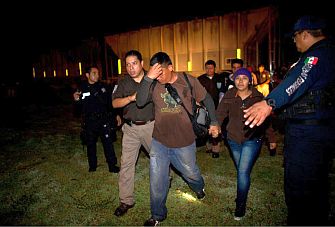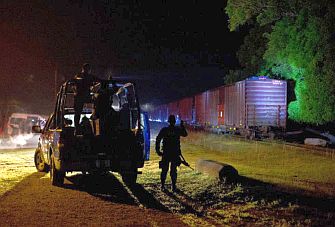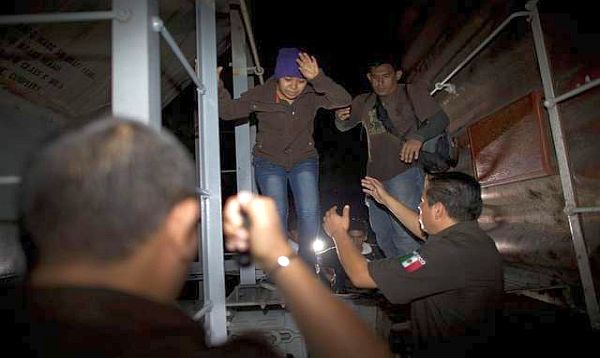Tierra Blanca, Mexico — Soon after crossing from Guatemala into Mexico last week, the group of Honduran migrants spotted the police swarming the freight train known as "The Beast" that has dangerously but reliably ferried tens of thousands of people north, clumped atop and hanging off box cars.
So they walked through bushes and along riverbanks to avoid detection. And then they walked some more, 10 hours a day for several days, parched and so starved that they grabbed what fish they could from the streams and fruit from the trees.
"We were hungry so we took an orange from the tree, and the owners of the house behind it started shooting at us," said José Antonio Alvarado, 22, resting here, 400 miles from the Guatemala-Mexico border, while he waited for a train to depart.
Just a few months ago, migrants like Mr. Alvarado readily crossed Mexico’s southern border and hopped on nearby trains heading north. But under pressure from the United States and other Central American nations, Mexico in recent weeks has taken a rare step toward stemming the flow of migrants; sweeping them off trains, setting up more checkpoints, and raiding hotels and flophouses where they congregate on their journey north.
Those actions clearly have not halted migration, and, as Mr. Alvarado’s group shows, people are still determined to get on the train, if only farther north.
But the increasing difficulty of the trek — combined with high temperatures, the brisk pace of the deportation of Central Americans and a public-relations campaign that warns people that no visas await them in the United States — is among the factors that may explain why fewer migrants are now crossing into the southwestern United States, with a particular decrease in the number of children traveling alone or with a relative.
Last month, 3,141 children traveling without a parent were apprehended at the United States-Mexico border, a 70 percent decrease from June.
White House officials, who just a few months ago described the migrant surge as a crisis and scrambled to find detention space, have been careful not to declare the problem resolved, wary of a surprise influx.
 |
But interviews with migrants, shelter workers and Central American officials suggest that word has gotten back to the region that the journey is getting harder and that migrants might not make it through Mexico. Mexican authorities have deported more than 38,000 Central Americans this year and now regularly send busloads and planes of detainees back to their countries.
Mr. Alvarado’s group - mostly Hondurans fleeing deep poverty and dangerous criminal gangs - included only one child, an 8-year-old boy traveling with a man who identified himself as his father.
People who work with migrants here in southern Mexico said that the number of children seeking to cross the border had fallen considerably. But, they said, additional immigration routes could open, prompting a new stream.
"They will just find the blind spots of the immigration officials," said Consuelo, a woman who works at a shelter for migrants here in Tierra Blanca. She declined to give her full name for fear that the police would harass her for helping the migrants. She said that as many as 700 Central Americans a month were passing through in the spring, but that last month the number had dropped to about 375.
She and other aid workers said the retreat from the trains in favor of longer treks by foot would leave the migrants more vulnerable to gangs as well as to corrupt police officers and immigration agents. Many of the Central Americans have arrived with foot injuries.
But Mexican officials, embarrassed by widely publicized images of trains overloaded with stowaways, many of them children, promised that "The Beast" would no longer be allowed to serve as migrants’ main transport north.
Officials said that more than 6,000 people had been removed from freight trains in recent weeks and that in the near future border guards would run vehicles on the tracks ahead of the trains to detect people trying to board farther up the line. The tracks will be renovated to allow the trains to move faster, which might discourage people from jumping on, and steps will be taken to prevent people from sabotaging the rails to slow the trains.
Humberto Mayans, the Interior Ministry official directing the southern border-control effort, told reporters that the moves were taken to safeguard migrants and reduce the chaos that ensues when they rush to the tracks. Hundreds have been maimed in falls from the train, or raped, robbed or killed by criminals who prey on the passengers.
"It’s a strategy of respect for human rights and protecting the physical well-being of the migrants," Mr. Mayans said in a recent radio interview. "In no way will they be allowed to board the freight train."
It remains unclear whether Mexico will be able to sustain its efforts at its southern border; it has carried out similar operations in the past but not to this extent.
 |
But as migrants find ways around the country’s new barriers, Mexico may find itself, like the United States, in a prolonged cat-and-mouse game with border crossers.
Tierra Blanca has long been a jumping-off place for migrants, and a dangerous one. The brutal Zetas crime gang terrorizes the area, often kidnapping people for ransom under threat of death and demanding that migrants pay a fee to pass through the area.
Usually two trains pass through here daily, and shelter operators say they still see dozens of migrants aboard despite the crackdown farther south. So far, there have been no police raids here.
Last week, several migrants tried to board a petrochemical train that had stopped, but they were waved off by train employees. The migrants were told that the cargo was too dangerous and that they should wait for the next train that night, which they did.
"No matter how difficult it gets, the way north, it is always more difficult back home," said Mr. Alvarado, who described a life of no work and constant gang threats. "So I will try to get to the other side no matter what."
The 8-year-old boy, Carlos Alberto Cruz Menjivar, arrived in Tierra Blanca with Luis Alberto Cruz, who said he was the boy’s father, though they did not seem close and it was possible that he was a smuggler portraying himself as a relative, a common practice.
They took shelter in a small, dilapidated wooden house owned by an elderly couple who allow migrants to stay there for 40 pesos a night, about $3. The rooms are strewn with garbage and animal waste, but Carlos, carrying a tattered backpack, kept a cheery disposition.
Mr. Cruz said he was traveling with Carlos to the border so he could send him into Texas. He said he hoped Carlos would eventually reunite with his mother, who has been living in New York for five years.
Mr. Cruz settled under a tree with a dozen or so other migrants, searching the ground for dropped coins to buy food as night fell, waiting for the next train.
Original Story


